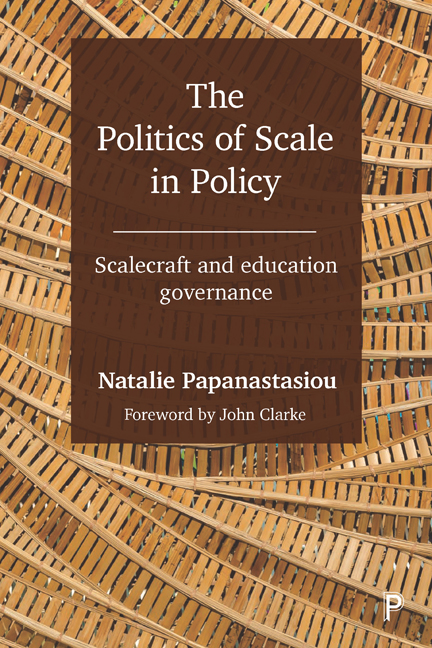Book contents
- Frontmatter
- Contents
- About the author
- Foreword
- Preface and acknowledgements
- 1 Policy, scale and the importance of space
- 2 Problematising scale in the study of policy
- 3 Exposing scale hegemonies
- 4 Knowledge, policy and scale
- 5 Hegemonies of statecraft and scale
- 6 Spatial entrepreneurs and scalecraft
- 7 The practice of scalecraft
- References
- Index
5 - Hegemonies of statecraft and scale
Published online by Cambridge University Press: 27 April 2022
- Frontmatter
- Contents
- About the author
- Foreword
- Preface and acknowledgements
- 1 Policy, scale and the importance of space
- 2 Problematising scale in the study of policy
- 3 Exposing scale hegemonies
- 4 Knowledge, policy and scale
- 5 Hegemonies of statecraft and scale
- 6 Spatial entrepreneurs and scalecraft
- 7 The practice of scalecraft
- References
- Index
Summary
Statecraft has become a fundamental concept in the field of policy studies which originates in the work of Jim Bulpitt (1983; 1986) who sought to understand how the political elite exercise power from the centre. Bulpitt's notion of statecraft reflected the longstanding interest of political science in the exercise of power and its novel contribution was to extend this by focusing on the particular sets of skills and strategies deployed by governments. With the rise of the governance literature, the notion of statecraft has been broadened to refer to the ‘art of government’ by which the state ‘seeks to unify the activities of different branches and departments across its different sites, scales and fields of action’ ( Jessop, 2016, 85).
This chapter argues that notions of statecraft serve as a reminder of the enduring importance of hierarchy when studying governance. In short, statecraft ‘highlights the motives and behaviours of states and governments and how politics and power – as well as broader structural issues – are important in shaping behaviour’ (Pemberton, 2016, 1308; Buller and James, 2012). By approaching statecraft as a hegemonic strategy deployed by the state, this chapter aims to reveal how practices of scalecraft are a key strategy of statecraft.
The chapter takes a different approach to the small number of studies that have already begun to explore the relationship between statecraft and scale. These studies have focused on processes of rescaling as a form of statecraft and explore how ‘states seek to practice what they do partly through a scaling and rescaling of their activities’ (Pemberton, 2016, 1309; Pemberton and Searle, 2016). Rescaling is a concept which points to how the reconstitution of the state's ‘scalar architectures’ are central foci of statecraft (Brenner, 2004; Jessop, 2002; 2016). The literature on rescaling has typically understood this as a process involving the state responding to capitalist restructuring. According to this approach, processes such as globalisation and neoliberalism require the state to adapt to new governance conditions by re-allocating and re-emphasising where different features of state authority are located across scales. The rescaling literature highlights the political nature of scale to some extent in terms of how political choices are articulated through the allocation of resources and responsibilities across the scalar architecture of the state.
- Type
- Chapter
- Information
- The Politics of Scale in PolicyScalecraft and Education Governance, pp. 69 - 88Publisher: Bristol University PressPrint publication year: 2019



